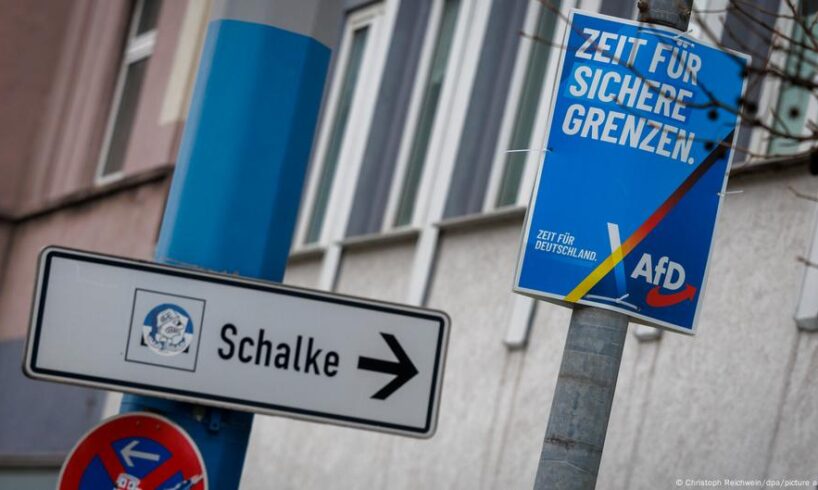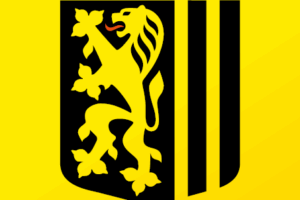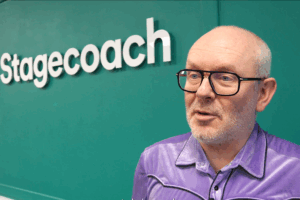
With a roaring noise, the yellow excavator razes the last remains of another derelict property in the Bismarck district of Gelsenkirchen to the ground. An entire street with seven houses is being flattened to make way for new houses and a kindergarten.
The dilapidated properties and piles of rubbish in the street were not only a huge nuisance for local residents, but also a big campaign issue for the far-right populist Alternative for Germany (AfD)which linked it to labor migration from Southeast Europe.
Criminals lured people, mainly from Romania and Bulgaria, to Bismarck using a mafia-like system of exploitation, housed them in dilapidated buildings in sometimes catastrophic conditions without electricity or water, offered them part-time jobs, and also collected their welfare checks.
The city, where one in four people live on social welfare, has purchased dozens of the dilapidated houses and is now having them demolished.
Demolition work is underway on Ahlmannshof street in Gelsenkirchen to make way new housingImage: Oliver Pieper/DW
The demolition work can still be faintly heard at the convenience store just around the corner, but it seems as if the message of a new beginning has come far too late. “The establishment parties finally need to be taught a lesson,” “The situation is getting worse and worse” and “We have no hope left,” locals who wished to remain anonymous told DW.
Asking residents here whether they would cast their vote for the center-left Social Democrats in this long-standing SPD stronghold draws a nervous laugh. When asked who else they will vote for on Sunday, no one wants to comment.
AfD mayoral candidate hoping for election runoff
After the AfD, which is classified as partly right-wing extremist, became the strongest force in the city of 265,000 inhabitants with 24.7% of votes in the federal elections in February, it is now hoping for more success deep in western Germany.
It will be the first test of public opinion during the term of the new coalition government led by the conservative Christian Democrats (CDU), its Bavarian sister party the Christian Social Union (CSU) and the SPD.
The AfD has even received support for the local elections in North Rhine-Westphalia, the most populous federal state with 18 million inhabitants, from tech billionaire Elon Musk.
Five years ago, the party won just under 13% of the vote and 11 seats on the city council in Gelsenkirchen. According to opinion polls, the council is likely to move to the right in these local elections.
The AfD is fielding 72-year-old Norbert Emmerich in the race for mayor. The financial advisor and former soldier, who is campaigning entirely on the issue of security, has an excellent chance of reaching the runoff election against SPD candidate Andrea Henze.
An AfD mayor in western Germany would be a first — but it is highly unlikely, because the other parties would support the alternative candidate in any runoff.
Fears of funding cuts to come
“I’m really afraid that the AfD will achieve a very good result on Sunday. Because we take care of the people here who would prefer to deport, put them on a bus, off and away,” Venetia Harontzas told DW. “And the AfD is confident of victory without doing much campaigning. Their attitude is: ‘We’ve already got it in the bag, we just have to count the votes.'”
The 69-year-old social worker is an institution in the city, known to many only by her nickname “Mother Lalok.” “Lalok libre” is the name of the youth and family center where she works, just a stone’s throw away from the dilapidated houses. It provides a place to stay and socialize for 30 children and young people from twelve different countries every day — children who hardly anyone else believes in.
“Our guiding principle is integration through culture, because culture is the only thing where you don’t need language,” says Venetia HarontzasImage: Oliver Pieper/DW
Like 11-year-old Estera from Romania, who is determined to graduate from high school and then become a dancer. “Venetia is like a second mom to me. She takes care of paperwork and makes sure we get to dance and that we have school bags and clothes. And we go on lots of trips,” she says.
Harontzas sees her life’s work in danger if the AfD actually comes to power in Gelsenkirchen. The party has already hinted that the city no longer needs equal opportunity organizations or integration projects, she says. The closure of “Lalok libre” after more than 40 years, could have grave consequences.
“I don’t even want to imagine what would happen to the children then; they would end up on the streets or rot away at home,” says Harontzas, who has just helped another young person into training. “I don’t know what will happen to us. But I fear the worst, because the money we receive from the municipality is a voluntary contribution.”
Intimidation campaigns against AfD critics
Jan Specht is the name of the man who, in the city council and on the streets, is fighting like no other to prevent the AfD from gaining even more power in the former mining town. The 44-year-old engineer has been a member of the left-wing AUF (“Anti-Fascist, Independent, Progressive”) party for six years and has already organized two demonstrations against the AfD.
He told DW that their work in the city council is not very constructive: “They often adopt motions from other municipalities on gender issues, early childhood education, or sex education that have little real relevance to Gelsenkirchen. Or issues such as the work of the immigration office, such as how deportations can be accelerated.”
According to the Westdeutsche Allgemeine Zeitung newspaper, there was a scandal at the city council meeting in June when AfD politician Tobias Obernyer insulted the incumbent mayor, Karin Welge, by telling her to “shut up.”
The AUF’s Jan Specht and Martina Reichmann say job losses have contributed to the success of the AfDImage: DW/Oliver Pieper
Welge wanted to expel him from the chamber, but Obernyer denied making the remark. Specht is also facing blowback in the form of 500 comments from AfD supporters on a video he made criticizing the party. Specht’s predecessor on the city council, Monika Gärtner-Engel, even received death threats.
He says many Gelsenkirchen residents know what is at stake in this local election and do not want the AfD to become more powerful. He always gives the following advice to undecided voters: “The AfD is against the minimum wage, against the top-rate of tax and inheritance tax, and they want to abolish trade tax in the municipalities. It is not a party for the little people.”
This article was originally written in German.
While you’re here: Every Tuesday, DW editors round up what is happening in German politics and society. You can sign up here for the weekly email newsletter, Berlin Briefing.




